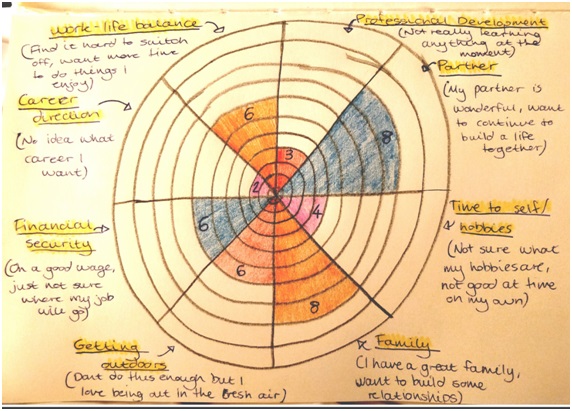A Research Paper By Amy Morton, Expat Coach, UNITED KINGDOM

Everybody deserves a good coach…[and expats all the more!] Bill Gates
Having worked with expatriates in the corporate world for 10 years and now being an expat myself as a military wife, I have seen the struggles that the expat spouse, in particular, military spouses have had to overcome to adapt to their new life abroad. Most recently, my one-to-one coaching sessions with military wives in Brunei during a global pandemic have highlighted the importance of coaching when reframing the disempowered perspective of an expat spouse to a more empowered belief working together for themselves to build a happier, healthier, and more fulfilling life while on assignment.
Facilitating Fulfilment for Expatriate Military Spouses
This paper explores the possibility of coaching as a tool for facilitating fulfillment for expatriate military spouses and how working with individuals’ unique and specific circumstances can assist in the spouse’s reflection on challenges; creating solutions, finding opportunities, and developing themselves in their new country. This paper brings together theoretical frameworks learned from ICA together with academic and my research.
Challenges of an Expatriate Spouse
Living abroad is not all sunshine and siestas. Despite social media presenting it that way, its challenges are often underestimated. From my experience in both the corporate and military spaces, common feedback of moving overseas includes but is not limited to the following common themes:
- Loneliness and Displacement
- Expat Blues
- Identity Loss
- Culture Shock
- Loss of Confidence
- A shift in roles in a relationship and a feeling of resentment.
Once everything has been unpacked, the children are in school and the husband has started work, the spouse is then left at home thinking what next. In my experience, the majority of expat spouses (usually the wives) have had to sacrifice their careers and press pause on their professional development and ambitions. Women are far more likely to drop their careers to follow their husbands overseas. Up to 84% of expat spouses are women, and 72% of unemployed expat spouses said they left a career when they moved abroad, according to the 2015 InterNations survey. The spouse is far more likely to be negatively affected by the move because they have given up more and they have less support available in the new country.
Instead, the spouse is now left at home all day managing the household, figuring out day-to-day activities such as registering with doctors, finding the local hospitals and transport together with setting up the payment of bills to name just a few. What would normally be considered as simple tasks at home are often now made more challenging due to cultural and language barriers, frequently without any support systems.
It is not just careers that the spouse has left behind but also their former social circles and lifestyle leading to a loss of identity and purpose. This lack of structure can further develop into feelings of isolation and frustration. This newfound freedom can be exacerbated in places like Southeast Asia, such as Brunei, where lower costs of living and the employment of staff can allow for a completely new, relaxed way of life.
Culture shock is one of the most common themes that arise when coaching expat spouses. “We experience a cognitive dissonance when our values and beliefs clash with those of the new culture.”[Accessed 5 Aug. 2021] Once the honeymoon phase of living in a new exotic place is over the reality of communication issues and lack of knowledge of the new culture sets in and is taken over by feelings of isolation, anxiety, and depression. The once exciting differences now seem tiring and frustrating.
To add to these feelings, the terms ‘trailing spouse’ and ‘dependent’ are large contributing factors to a spouse’s sense of inferiority; creating the belief that they are wholly reliant on their husbands. This is an issue that is even more prevalent in military life and is explored later in this paper.
The Perceived Benefits of Expat Life of a Military Spouse
For many families in the corporate space, it is a conscious decision to move abroad due to rich expat remuneration packages and the perceived benefits of expat life including but not limited to; higher salaries, better amenities, a chance to explore the world, and better education. An international assignment is also generally for a limited time on average between 3-5 years. This is not so much the case for military spouses.
The destination of military postings is often unknown and the military family’s awareness of an international move can be made with as little as two weeks’ notice. Military families move frequently and the civilian spouse often only has the hope of finding another job.
The lack of flexibility in postings and demands of military life often produce the belief that the spouse has no choice but to put their goals on hold.
Military Spouse Employment
Due to inconsistent job history and large gaps of employment on CVs, employers are more reluctant to offer jobs to military spouses. This then leads to the expat partners experiencing difficulty in acquiring relevant work experience for high-paying or fulfilling jobs making it challenging to get and progress on the career ladder.
According to the most recent Service Families Continuous Attitude Survey 2021, just over half of military spouses (51%) feel negative about the effect of service life on their careers. A third of Army spouses reported being dissatisfied or very dissatisfied with their career and educational opportunities.
Many army bases are located in areas where there is a significant lack of job opportunities. The demand for certain occupations is not there thus unemployment or being employed in a role lower than the spouse is qualified for is common. Obtaining work visas can also be an issue.
Military spouses are frequently disadvantaged in the workplace, facing bias over their lifestyle choice which has severe implications for their career opportunities.
Emotional Strain on the Military Wife
Deployments can have a huge emotional impact on the military wife. Apart from dealing with separation and looking after the children and household alone, service members need a great level of emotional and logistical support, often exhausting the spouse of time and energy. Military spouses have highlighted the challenges of balancing the need to provide their partner with love and support while trying to pursue their own goals.
The challenges a military spouse could therefore experience are that of those described in this paper for an expat spouse but with added demands. The emotional stresses brought on by deployment, relocation, and the constant reintegration frequently act as roadblocks for a military spouse’s goals leaving them feeling unfulfilled with life.
Challenges of an Expatriate Military Spouse in Brunei During a Global Pandemic
The 2020 pandemic has exacerbated homesickness and has caused people living abroad to rethink their long-term potential plans.
Brunei, a country located on the north coast of Borneo, is usually an enviable posting; a platform for traveling around South East Asia. However, during a global pandemic with lockdown and borders just 20 minutes away shut it has posed significant problems to the mental wellbeing of the military spouses based there.
The base is an isolated station in an already challenging environment in a small nation. There is very minimal recreation and leisure activities and almost non-existent public transport to get around. Sharia Law is heavily enforced in the country and the sale and consumption of alcohol are strictly forbidden. Add on top of this a global pandemic and lockdown then you have an individual displaying all the challenges of an expatriate spouse and a military spouse but exacerbated. When coaching 15 of the expat spouses it was clear that not only were they struggling with finding fulfillment but also in need of a morale boost.
How Can Coaching Help Expat Military Spouses Find Fulfilment?
What creates a fulfilled life is different for each individual however fulfillment is believed to be achieved when we are aware of our most authentic selves and actively living in alignment with our core values, life purpose, strengths, and natural gifts and talents.
Coaching supports military spouses and helps them find their version of fulfillment through the following ways:
- Achieving both their tangible and intangible goals, becoming unstuck in living the life they want to live.
- It has the potential to take the client beyond what they believe they are capable of achieving by exploring and making them aware of the hidden potential within themselves.
- Supporting the spouse with redefining themselves in their new location both professionally as well as socially, providing a non-judgmental space to acknowledge feelings as well as establish goals.
- Confidence for CV writing and job applications.
- Surviving deployments.
- Gaining clarity and setting priorities.
- Balancing a career and a healthy marriage.
When coaching military wives in Brunei, I apply the following process to assist expats in helping themselves live a more realistic, happier, and more fulfilling life overseas.
- Uncover expat intention and goal. Common expat goals include learning a new skill such as the host country’s language, career transition and development, and overcoming culture shock and expat blues.
- Design a realistic plan.
- Identify roadblocks.
- Build confidence.
- Reward yourself.

Benjamin Zander Exercise
Expats are faced with many challenges where they need to think outside the box. I often use the Benjamin Zander exercise as below to remind clients of the importance of looking outside the known and enabling them to think creatively about potential solutions.
Wheel of Life
The Wheel of Life is an extremely popular visual tool often used in coaching to help clients quickly understand how balanced or fulfilled their life is in this moment. I find it the most useful tool to use when coaching military spouses. Figure 2 is an example taken from an expat spouse that I coached earlier this year. It usually consists of 8-10 areas considered important for a balanced life. Clients will rate their level of satisfaction with each area and map this onto a wheel. This then allows clients to see immediately which areas of their life might need improvement.

This example is typical of a military spouse; out of the 15 clients I have had in Brunei, each one of them highlighted that time to oneself and career direction are both areas where they are not feeling fulfilled. After coaching, 11 of the individuals had drafted a CV, many of them their first, and even found the confidence to apply for a job.
Expatriate Military Spouses Values
Moving to a new country is an ideal opportunity to reflect on current values and life purpose. A simple values exercise creates the perfect space for realignment of current and future goals. Values are not who we would like to be, not who we think we should be, but who we are in our lives, right now. I explain to military wives that values represent our unique and individual essence and most fulfilling form. When we honor our values consistently, our life is fulfilled.
This is a simple exercise where the client is given a list of around 40 different values. The individual simply needs to circle the most important values that resonate with them, without overthinking their selection.
Coaching, specifically for expat spouses is increasingly being recognized as a vital service for the success of expatriate assignments and the welfare of spouses in military life.
A new start in a foreign country requires courage, a positive mindset, and support throughout the journey. While some expat spouses easily find employment and settle into their new lives simply; many find themselves lost, needing to reinvent themselves and find unfulfilled goals to transition from an unhappy expat to one experiencing a more meaningful and fulfilling life abroad.
Moving to a new country can be challenging but coaching aims to flip these disempowering beliefs, instead of unlocking the spouse’s full potential by allowing them to see the overseas posting as a liberating opportunity for immense personal growth.
References
Books
Herbolzheimer, A. Coaching Expatriates. Kassel: Kassel University Press GmbH.
Rosamund Stone Zander and Zander, B. The art of possibility: transforming professional and personal life. Camberwell, Vic.: Penguin.
Reports
Ministry of Defence. UK Tri-Service Families Continuous Attitude Survey 2021. Ministry of Defence.
Websites
Anon, Why we experience culture shock | Chameleon Intercultural Training & Expat Coaching
Global Business Skills - crossculture2go. (n.d.). Expat Spouse Support - crossculture2go - Business & Career Success.
militaryfamily.com. (n.d.). We Can Do It: 4 Challenges and 6 Solutions for Military Spouse Education and Careers.
www.internations.org. (n.d.). Expat Insider 2015: The World of Expat Spouses | InterNations.
Wheel of Life. How balanced is your life? Get your free online assessment at wheeloflife.noomii.com.